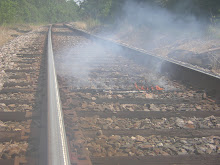So that "less" of our front, side and back yards can be condemned by the gas companies, the Ft. Worth city council is considering allowing the gas pipelines to be placed under our streets (about 30-50 feet from our front doors). Even though our Ft. Worth City Government (Mayor + 8 Council members) have not seen to it that:
* the Texas State Railroad Commission has the staff needed to do required inspections
* we know who is responsible for every inch of the pipelines should something go wrong
* the gas companies and City of Ft. Worth know how the gas is going to get from the drillsite to the consumer before allowing the drilling to begin and how the massive amount of heavy trucks and industrial equipment are going to get to/from the drillsite
These are just a few of the many issues that our City Council members and Mayor decided to overlook BEFORE they issued drilling permits (1400+ and counting).
Some quotes on the compromise of allowing high pressure gas pipelines under our streets as opposed to our yards:
"People in Fort Worth care, [and] they want to hear all sides of the issue," said Shirley Gansser, neighborhood league president
"This won’t be the solution in every case," CFW Planning & Development Director
"It’s a great compromise." Councilwoman Kathleen Hicks
"I don’t know. Pipeline routing is a complex process. It’s going to take a lot of study to see if it’s even legally possible." Ed Ireland, executive director of the Barnett Shale Energy Education Council
Councilman Carter Burdette said, "We might want to explore the possibility of the city requiring complying with federal standards from wellhead on out."
"I’m just looking at the safety of the citizens I serve, and I don’t see it," Councilman Chuck Silcox
"One of the things I’m concerned with is what would happen in 30 years as the major operators start moving out" CFW Planning & Development Director
"State rules make it easy for pipeline companies to acquire the authority to condemn land, and there’s far less oversight of pipeline routes than for other public utilities such as electric lines." Attorney John Johndroe


No comments:
Post a Comment